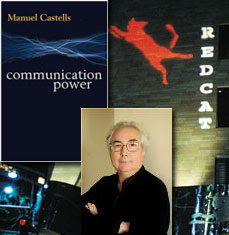I had the opportunity to attend a conversation between Manuel Castells (USC Wallis Annenberg Chair of Communication Technology and Society) and Steven Lavine (President of CalArts) at the REDCAT. The topic of the evening was The Technology of Power in the Digital Age. Castells, who recently authored the book Communication Power, and Lavine discussed the power of the Internet and how it relates to today's politics, media, and the human experience.
Although the Internet is a recent phenomenon and just beginning to truly dig its heels in shaping how humans communicate and interact, as a means of communication it already becomes tied to an existing aspect of human history. Castells emphasized that the "control of information is the most important form of power". Essentially, those who control information can ultimately control the people. He described that having this power is greater than having the physical power over others, such as the threat of physical torture.
As Castells and Lavine discussed the gamut of topics about power, they touched upon media and how - to some extent - it owns the major infrastructure of the Internet but yet ultimately the Internet provides an outlet for grassroots initiatives and actions. Castells pointed out that media might own the infrastructure and major sites, but they cannot control all the information sources. Because of the ability for other groups to communicate digitally, there is a communication freedom and thereby the Internet provides a balance between power owners and grassroots communities.
Part of the conversation discussed how many people are seeking what they want to hear, reinforcing their own beliefs. Lavine wondered here about the reinforcement of ideas from the same media voice perhaps pushing a specific agenda, bringing up the conservative Fox network as an example. Castells brought up the point that media is ultimately driven by business and profit. So the same media that might be pushing conservative viewpoints in one region may be pushing liberal viewpoints in another. The context there is not that the media has an agenda, so much as they can profit on a specific viewpoint. He emphasized that the Internet provides for a plurality of views and while it can't change the whole context of, it can possibly provide a necessary counter narrative that has the ability to create change.
My favorite part of the discussion was about "Internet is a hybrid experience" and Castells' points about art. Now that people are connected to networks on mobile devices, there is an increased accessibility to networks, but the Internet is a means of communication that is most successful when tied to real-life experiences. Thus, the Internet is a hybrid of the on-line and the off-line. Castells also noted that art is a "cultural bridge of human experiences". While the brain is the best kind of computer and live performance is the best kind of interaction with art, the Internet provides an additional overlay to art, providing people with a digital interpretation of experiencing it.
Now, it might be my user-bias as an ExperienceLA.com fan and blogger (and reinforcing what I already belief), but I think the last points about art and the Internet really speak to the message of ExperienceLA.com. 1) Online: Use the Internet and go on ExperienceLA.com as a tool to find events to go to and then 2) Offline: Go out an actually experience it...working the best computer of all, the brain!
-Charity Tran
Check out more events at the REDCAT on ExperienceLA.com.

No comments:
Post a Comment